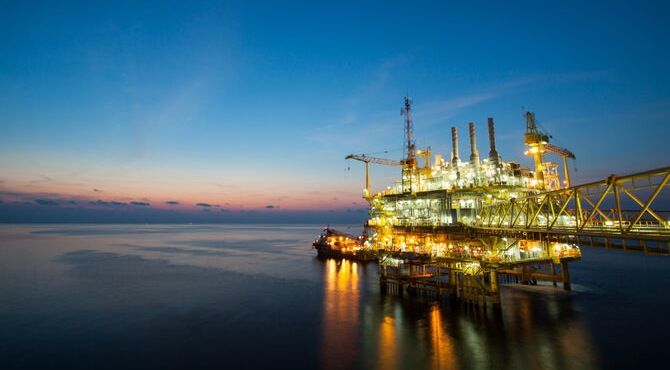North Sea oil industry 'getting its head above water'
The UK's oil and gas industry is slowly recovering from a year of "torment" when it posted negative tax receipts for the first time in history, according the sector's trade body.

 21 February 2017
21 February 2017He added that, over the next five years, he could see the North Sea delivering £7–8 billion in total tax revenues. "We don't see the same depth of yield of taxes in the years ahead, simply because of the pressures the industry is under. This year we're probably just about holding our heads above water this fiscal year, just about balancing tax receipts."Mr Tholen said firms operating in the UK had cut costs, including extensive staff reductions, in a bid to make the industry more efficient, but he said the North Sea operations remained expensive and were coming under pressure from the US shale industry."The UK is an expensive place to do business, operation costs, particularly costs per unit barrel, are towards the top end, top quartile, too often."When asked why, Mr Tholen replied, "Just simply the geography and the costs of operating offshore.""What we have seen is a lot of work over the years to really take costs down by being smart, by being efficient and by being savvy. There have been good examples of that by many companies in the North Sea."People have searched their soul to make sure they can sustain a safe and durable business for the long term. The good news is the oil and gas is out there and we have a great set of technologies and a great set of people."It will only work, though, if we can be competitive at oil prices which are going to set in the 50s, perhaps for many years to come. Our biggest competitor is probably onshore shale in the States. The waters are very shallow there, it's very easy for them to do their work, so we have to be able to do very smart things very cheaply and very effectively to be competitive on a global scale."
Mr Tholen's remarks coincided with a report from geologists suggesting there may be reserves of oil and gas in areas off Scotland's coast that have previously been dismissed.The University of Aberdeen examined oil in rock formations around Rockall, some 300 miles west of mainland Scotland, and concluded that previous, unsuccessful test drillings had concentrated on the wrong areas.Geologist Dr Nick Schofield said, “The Rockall Basin is one of the most challenging environments on earth when it comes to hydrocarbon explorations, but our analysis has revealed that one of the barriers to success may have been a misunderstanding of the subsurface geology.“By analysing seismic data, and using what we have learned through our work in the Faroe-Shetland Basin, we found that the character of areas where operators hoped to find oil may have been misleading.”Access hundreds of global services and suppliers in our Online Directory
 Get access to our free Global Mobility Toolkit
Get access to our free Global Mobility Toolkit 
©2025 Re:locate magazine, published by Profile Locations, Spray Hill, Hastings Road, Lamberhurst, Kent TN3 8JB. All rights reserved. This publication (or any part thereof) may not be reproduced in any form without the prior written permission of Profile Locations. Profile Locations accepts no liability for the accuracy of the contents or any opinions expressed herein.









































